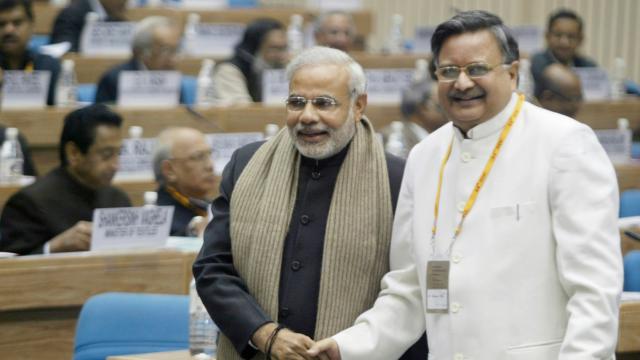India’s right-wing, arch-nationalist Bharatiya Janata Party (BJP) is using government-subsidized cell phones that have been handed out to millions of people as a campaign tool, the New York Times reported on Sunday, with the BJP using a $108 million free-phone program in the state of Chhattisgarh to appeal directly to voters.
According to the Times report, the program in Chhattisgarh distributed free phones to 2.9 million people and includes plans to construct hundreds of cell phone towers.
Now a small army of “about 350 contractors, originally hired by the state but now paid by the BJP,” are working the phones, dialling the numbers of recipients, collecting data, and then handing it over to party activists working for the state’s BJP chief minister Raman Singh ahead of legislative elections:
Reading from a script that pops up on their screens, the callers ask the recipients if they are happy with the device and the mobile service, and also poll them on their satisfaction with other government programs championed by Mr. Singh.
The callers then ask people whether they plan to vote and which party they intend to vote for, according to half a dozen people who made or received the calls.
The state B.J.P. uses the data to steer party activists to visit voters who said they intended to vote for the opposition Indian National Congress or abstain, according to a longtime B.J.P. worker briefed on the strategy. “They are misusing state machinery for personal gains,” said the worker, who requested anonymity before discussing confidential party matters. “When we are in the government and have done so well, why do we need to do this?”
According to the Times, the phones distributed via the program also have a photo of Singh’s face as the default background image, as well as come preloaded with apps promoting news releases from Singh and fellow BJP politician Prime Minister Narendra Modi.
Using the apps in question prompts the user to share their contact lists as well as other personal data with the BJP, the paper added.
The use of the phones and their associated data for political purposes has attracted scrutiny, particularly from the BJP’s opponents in the center-left Congress Party and officials with the state electoral commission. Congress Party members have filed a complaint alleging that the state data should be made available to all parties and accused the call center operator, Magnum Group, of violating laws prohibiting the use of government resources to do election work, the Times wrote.
(Magnum Group was originally contracted to “manage customer service” and perform do surveys about service quality, the paper wrote, though the call center has since been hired by individuals unknown to the public.)
Chhattisgarh’s top election official, Subrat Sahoo, told the paper that while the call center itself may be legal, the BJP may have improperly accessed lists of who received the phones:
Subrat Sahoo, the chief electoral officer for the state, said in an interview on Saturday that the B.J.P.’s use of Magnum to make calls was legal as long as the party paid the bills. But he said that commission officials in New Delhi were examining whether the B.J.P. was given improper access to the list of phone recipients. Mr. Sahoo wrote the Chhattisgarh agency in charge of the data on Nov. 1 and told it not to share it.
A previous piece in the Economic Times noted that while “almost all” major political parties in India have invested significantly in data analytics and social media operations, the BJP had invested more time and effort than others.
That report noted that ahead of the May 2018 Karnataka Assembly elections, BJP workers and volunteers created at least 23,000 chat groups on WhatsApp, an encrypted chat service and Facebook subsidiary that has become a major political tool in some countries which either lack widespread wireless infrastructure or expensive data rates see residents turn to wi-fi networks (such as Brazil).
Alex Paul Menon, who runs the Chhattisgarh Infotech Promotion Society, which in turn runs the phone program, told the Times that it was not designed for political purposes and was instead a form of “nation building.” He also told the Times that his agency does not share user data and that the apps that came on the phones were selected by a state committee.
According to the Times, polls run by the state show recipients are using the phones for standard purposes — speaking with relatives, browsing the web, and texting — but interviews with a number of locals showed “they were barely using the phones”, which are allegedly poorly built and suffer from a number of technical issues and limited data rates.
However, the paper also added that the BJP has also rolled out a similar program in the state of Rajasthan, and it is under consideration elsewhere.
